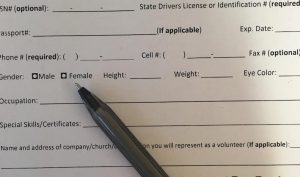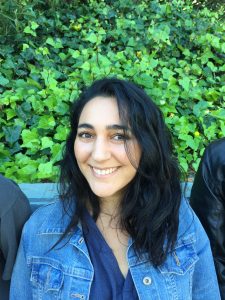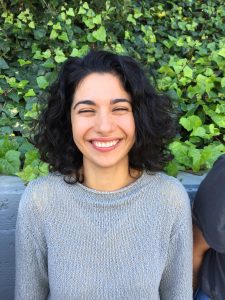KALW Audio Academy Takes Lead on Telling Driver’s License Non-Binary Gender Designation Story
By Ben Trefny, News Director, KALW Public Radio
I’d like to share a story about some work that two of our Audio Academy fellows accomplished that really exemplified the kind of community building, inclusive, public interest journalism we try to make at KALW.
I’ll start from the end. On October 15th, Governor Brown signed a bill that created a non-binary gender designation to driver’s licenses. Ten days earlier, we aired our own story, anticipating and contextualizing what would be an important decision by a man who had little personal history with the issue. The initiative to pursue that piece stemmed from a conversation I had with our Wednesday fellows, Asal Ehsanipour and Zeina Nasr.
From here, they’ll tell the tale of their experience in their own words.
Thoughts from Asal Ehsanipour:
I applied to KALW’s Audio Academy because, more than ever before, I felt that amplifying the diversity of voices in our country is more than important — it’s crucial. Zeina and my first assignment about Governor Brown’s bill adding a third gender marker to CA state IDs cemented that notion for me. A discussion about the bill would have been incomplete without hearing from the people directly affected by it. To do their stories justice, Zeina and I gathered a variety of perspectives to offer a human element to the issue.
Thoughts from Zeina Nasr:
I’m not very good at talking to strangers. Moments of confrontation or intimacy with friends and colleagues don’t faze me, but going up to a stranger with a microphone in hand, asking them to share their opinion on ______ ? And may I record you saying that? Not my thing. It feels intrusive and impolite. My reticence has something to do with the notion of “being a good girl” as well as being safe. As a woman, I have been taught to be courteous and warned to be wary of strangers, especially men. I’ve been told to walk away rather than towards them. In this sense, my female gender has shaped a key aspect of my personality, and when Asal and I were given the assignment to collect some informal perspectives from members of the non-binary community on the yet to be passed SB-179 Gender Recognition Act, I was nervous.
As it turned out, walking up to strangers and asking for their opinions on this issue didn’t really work. The nonbinary community is a minority within a minority. Speaking with someone who has a vested interest in the establishment of a nonbinary marker on state identified documents is not simply a matter of walking around Lake Merritt and stopping the first person whose path you cross. In most cases, this person will not identify as non-binary or even queer, and if they do, they may not want to speak with you. I learned this very quickly when I went to the Mills College campus, hoping to speak with students. I found myself walking around campus looking around for someone who might look “queer” or “nonbinary” and I immediately felt ashamed at my own behavior. How could I identify such a person, and if I did, how would I start the conversation? “So, I see that you might have something to say about…” No. This was not the right way to go about things. Not only was it ethically questionable, but it was also fruitless. There were very few students walking around campus that afternoon. I ended up speaking to two undergraduate cis-gender women sitting outside the library who wholeheartedly supported the bill but were not personally affected by it.
In a final effort to fulfill the “talking to strangers” aspect of this assignment, I left the Mills campus and drove to Queer Gym. My Audio Academy mentor Andrew had recommended that I go to there and stand outside. The idea was that I could catch people on their way in and out of the gym, and since it specifically served members of the queer community, some of them might be personally affected by the bill. I braced myself and drove to the gym. It turned out to be a small space in an otherwise residential part of East Oakland. No one walked in or out in the ten minutes I stood outside, so I braced myself yet again and walked in. I spoke to a trainer who directed me to the receptionist, and though the gym members were too busy exerting themselves to speak to me, the receptionist quickly offered to speak to me herself. Thank you, Adrienne Suzio! Adrienne, a queer cis-gender woman, though not directly affected by the bill, had many thoughtful things to say about it, namely that the government should not be involved in matters of designating gender, be it using binary or nonbinary markers. Speaking to Adrienne heartened me. I had conquered my fear (at least temporarily) of talking to strangers, and I was ready to gather more perspectives.
From this point on, Asal and I agreed to reach out to people through our personal networks. No more standing outside of gyms or wandering around college campuses. After a couple days of sending emails and text messages, we were able to connect with four nonbinary people and set up appointments to speak with them. I was moved by their openness and generosity. It may be hard for me, as a woman, to speak to strangers, but for a nonbinary person who has faced various forms of judgment and discrimination for most of their lives, it can be much more challenging. And yet, they agreed to meet with us on very short notice and to address a very personal subject. I learned from Gabriell that they had been waiting their whole life for a nonbinary marker to be made available to them. I learned from Ysh that a nonbinary marker, although desirable in some ways, ultimately places them in yet another gender system to which they do not feel they belong. I learned from Boyd that when they changed their marker from “female” to “male” last year, they had actually wanted to be able to change it to “nonbinary.” And in completing this assignment, I learned that making connections with strangers in the service of reaching a deeper understanding on an important issue is worth the effort.
And final thoughts from Asal:
Our goal as a team was to treat the topic with nuance and care, and I’m so proud of the final product.
More importantly, our interviewees were happy with the final product, too. Here’s an email I got from Binya, one of the people included in the vox pop:
“THIS IS SO GOOD. Thanks for including such a beautiful diversity of non-binary voices, and I feel like this piece really did such a good job in educating and advocating around our community’s issues. Beautifully produced and welllll done.”



